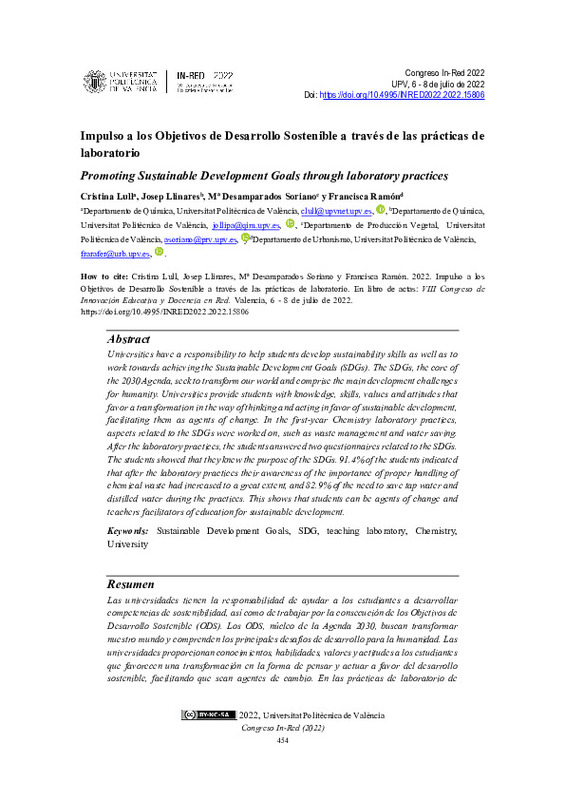|
Resumen:
|
[EN] Universities have a responsibility to help students develop sustainability skills as well as to
work towards achieving the Sustainable Development Goals (SDGs). The SDGs, the core of
the 2030 Agenda, seek to transform ...[+]
[EN] Universities have a responsibility to help students develop sustainability skills as well as to
work towards achieving the Sustainable Development Goals (SDGs). The SDGs, the core of
the 2030 Agenda, seek to transform our world and comprise the main development challenges
for humanity. Universities provide students with knowledge, skills, values and attitudes that
favor a transformation in the way of thinking and acting in favor of sustainable development,
facilitating them as agents of change. In the first-year Chemistry laboratory practices,
aspects related to the SDGs were worked on, such as waste management and water saving.
After the laboratory practices, the students answered two questionnaires related to the SDGs.
The students showed that they knew the purpose of the SDGs. 91.4% of the students indicated
that after the laboratory practices their awareness of the importance of proper handling of
chemical waste had increased to a great extent, and 82.9% of the need to save tap water and
distilled water during the practices. This shows that students can be agents of change and
teachers facilitators of education for sustainable development.
[-]
[ES] Las universidades tienen la responsabilidad de ayudar a los estudiantes a desarrollar competencias de sostenibilidad, así como de trabajar por la consecución de los Objetivos de Desarrollo Sostenible (ODS). Los ODS, ...[+]
[ES] Las universidades tienen la responsabilidad de ayudar a los estudiantes a desarrollar competencias de sostenibilidad, así como de trabajar por la consecución de los Objetivos de Desarrollo Sostenible (ODS). Los ODS, núcleo de la Agenda 2030, buscan transformar nuestro mundo y comprenden los principales desafíos de desarrollo para la humanidad. Las universidades proporcionan conocimientos, habilidades, valores y actitudes a los estudiantes que favorecen una transformación en la forma de pensar y actuar a favor del desarrollo sostenible, facilitando que sean agentes de cambio. En las prácticas de laboratorio de Química de primer curso se trabajaron aspectos relacionados con los ODS, como el manejo de residuos y el ahorro del agua. Tras las prácticas los estudiantes contestaron dos cuestionarios relacionados con los ODS. Los estudiantes mostraron que conocían la finalidad de los ODS. El 91,4% indicaron que tras las prácticas de laboratorio había aumentado en gran medida su concienciación sobre la importancia del manejo adecuado de los residuos químicos y un 82,9% sobre la necesidad de ahorrar agua del grifo y agua destilada durante las prácticas. Esto demuestra que los estudiantes pueden ser agentes de cambio y los docentes facilitadores de la educación para el desarrollo sostenible.
[-]
|









